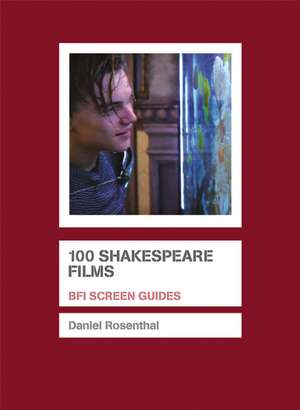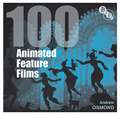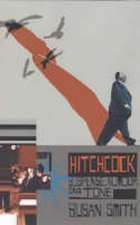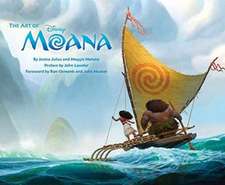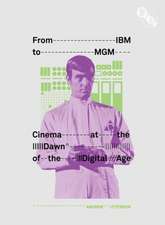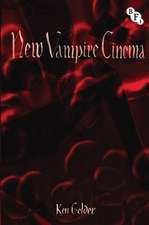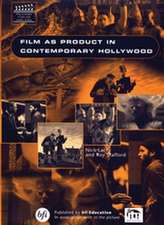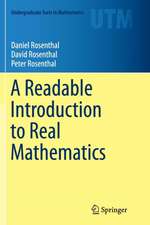100 Shakespeare Films: Screen Guides
Autor Daniel Rosenthalen Limba Engleză Paperback – 18 apr 2007
Preț: 119.05 lei
Nou
Puncte Express: 179
Preț estimativ în valută:
22.78€ • 23.85$ • 18.85£
22.78€ • 23.85$ • 18.85£
Carte disponibilă
Livrare economică 15-29 martie
Preluare comenzi: 021 569.72.76
Specificații
ISBN-13: 9781844571703
ISBN-10: 184457170X
Pagini: 298
Dimensiuni: 155 x 235 x 20 mm
Greutate: 0.45 kg
Ediția:2007
Editura: British Film Institute
Colecția British Film Institute
Seria Screen Guides
Locul publicării:London, United Kingdom
ISBN-10: 184457170X
Pagini: 298
Dimensiuni: 155 x 235 x 20 mm
Greutate: 0.45 kg
Ediția:2007
Editura: British Film Institute
Colecția British Film Institute
Seria Screen Guides
Locul publicării:London, United Kingdom
Notă biografică
Daniel
Rosenthal
was
born
in
London
in
1971.
He
is
a
freelance
author,
editor,
journalist
and
lecturer.
Previous
publications
include
Shakespeare
on
Screen
(2000)
and
Student
Editions
of
David
Mamet's
Oleanna
(2004)
and
Patrick
Marber's
Closer
(2007).
Textul de pe ultima copertă
From
Oscar-winning
British
classics
to
Hollywood
musicals
and
Westerns,
from
Soviet
epics
to
Bollywood
thrillers,
Shakespeare
has
inspired
an
almost
infinite
variety
of
films.
Directors
as
diverse
as
Orson
Welles,
Akira
Kurosawa,
Franco
Zeffirelli,
Kenneth
Branagh,
Baz
Luhrmann
and
Julie
Taymor
have
transferred
Shakespeare's
plays
from
stage
to
screen
with
unforgettable
results.
Spanning
a
century
of
cinema,
from
a
silent
short
of
"The
Tempest"
(1907)
to
Kenneth
Branagh's
"As
You
Like
It"
(2006),
Daniel
Rosenthal's
up-to-date
selection
takes
in
the
most
important,
inventive
and
unusual
Shakespeare
films
ever
made.
Half
are
British
and
American
productions
that
retain
Shakespeare's
language,
including
key
works
such
as
Olivier's
"Henry
V"
and
"Hamlet",
Welles'
"Othello"
and
"Chimes
at
Midnight",
Branagh's
"Henry
V"
and
"Hamlet",
Luhrmann's
"Romeo
+
Juliet"
and
Taymor's
"Titus".
Alongside
these
original-text
films
are
more
than
30
genre
adaptations:
titles
that
aim
for
a
wider
audience
by
using
modernized
dialogue
and
settings
and
customizing
Shakespeare's
plots
and
characters,
transforming
"Macbeth"
into
a
pistol-packing
gangster
("Joe
Macbeth"
and
"Maqbool")
or
reimagining
"Othello"
as
a
jazz
musician
("All
Night
Long").
There
are
Shakesepeare-based
Westerns
("Broken
Lance",
"King
of
Texas"),
musicals
("West
Side
Story",
"Kiss
Me
Kate"),
high-school
comedies
("10
Things
I
Hate
About
You",
"She's
the
Man"),
even
a
sci-fi
adventure
("Forbidden
Planet").
There
are
also
films
dominated
by
the
performance
of
a
Shakespearean
play
("In
the
Bleak
Midwinter",
"Shakespeare
in
Love").
Rosenthal
emphasises
the
global
nature
of
Shakespearean
cinema,
with
entries
on
more
than
20
foreign-language
titles,
including
Kurosawa's
"Throne
of
Blood
and
Ran",
Grigori
Kozintsev's
"Russian
Hamlet"
and
"King
Lear",
and
little-known
features
from
as
far
afield
as
"Madagascar"
and
"Venezuela",
some
never
released
in
Britain
or
the
US.
He
considers
the
films'
production
and
box-office
history
and
examines
the
film-makers'
key
interpretive
decisions
in
comparison
to
their
Shakespearean
sources,
focusing
on
cinematography,
landscape,
music,
performance,
production
design,
textual
alterations
and
omissions.
As
cinema
plays
an
increasingly
important
role
in
the
study
of
Shakespeare
at
schools
and
universities,
this
is
a
wide-ranging,
entertaining
and
accessible
guide
for
Shakespeare
teachers,
students
and
enthusiasts.
